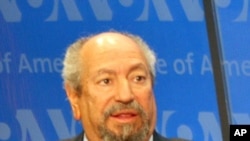Before January 25 and the youth revolution that brought down Hosni Mubarak, Saad Eddin Ibrahim was Egypt’s most well-known and well-publicized dissidents. After speaking out against irregularities in the 1995 elections, he served seven years in prison and many years’ exile in the United States. Now, he is preparing to return to Egypt and take part in the country’s rebuilding. VOA’s Cecily Hilleary spoke to him by phone earlier this week, and asked him just how involved he’ll be in the new Egypt.
Ibrahim: I am very involved. I write every week and I get a lot of feedback from the readership. It is in the main - now the first - newspaper in Egypt, called Al-Masry-Al-Youm, which has really replaced Al-Ahram as the first newspaper. It’s a free newspaper, and I’ve written in that newspaper since the second day I was released from prison, and I continue to do so.
So that is at least a minimum involvement. Above that, my center, the Ibn Khaldun Center, which has been in operation since 1988, is monitoring this election, as it has monitored all elections since 1990.
That, actually, was the reason why I went to prison, because when I documented the [vote] rigging and the [election] irregularities, the government was offended, by my publishing my report in foreign languages and exposing the corruption and the unfairness of the electoral process.
So we continue to do that. We never stopped, even despite the fact that I was only not only in prison myself, but all my researchers at the Ibn Khaldun Center, all 27 of them, were equally detained and served various terms from one year to three years. Mine was seven years. But nevertheless, it is a fight that we believe in, and the few of us who have taken risks have at least contributed to breaking the fear barrier, and this has accumulated until the 25th of January, that the whole world saw, witnessed.
So I am heartened. I leave the United States at the end of April to go back to continue my fight for consolidating the democracy and for helping our neighbors to become democratic. Because I truly believe that unless the regional neighborhood democratizes, democracy in one country could be suffocated.
Egypt's role in Libya
Hilleary: You have Libya next door going through such much turmoil. How involved do you see Egypt becoming? Would you like to see Egypt and the Arab League take a stronger role?
Ibrahim: Absolutely. To stand by the people of Libya. There is a dictator who has been in power for 42 years. That’s probably older than you are, Cecily. And he plans also to pass power to one of his sons. So we have this kind of chronic tyranny that we have to get rid of, and I am in touch with my people in Egypt, in my Center and elsewhere, and they are very much with their hearts - with Libya. They are trying to help as much as they could at the borders.
Of course, as you know, Egypt itself is in a state of after-shock after its own revolution, so it may not be in the best shape to offer the kind of help that they would have wanted Egypt, as the leading Arab country or the bigger Arab country, to lift a hand to Libya.
But nevertheless, I hope that the northern Mediterranean countries like Italy, France, Spain, let alone Germany, will somehow find ways to help Libyan people.
No-fly zone
Hilleary: What are your thoughts on the much-debated no-fly zone?
Ibrahim: Absolutely. I am with it. That was very effective in both Bosnia, the former Yugoslavia, and in Iraq. It is the minimum that the West or the established democracies can offer people who are in battle with dictators.
Hilleary: Who should lead?
Ibrahim: The U.S. definitely should lead. It remains the sole superpower in the world today. It’s the country whose values and whose ideals have inspired many people around the world. It has failed us at times. But at times it did not. And I hope the United States will not fail the people of Libya or the people of Bahrain, for that matter.
You know, President Obama, when he addressed the Muslim world from Cairo, he actually challenged the people of the Muslim world to rise up for democracy and freedom. So now that they have, I hope the U.S. will not fail them.
Hilleary: Dr. Ibrahim, it’s always a pleasure to talk to you.
Ibrahim: Thank you, Cecily, and my best wishes for my people and for all freedom fighters around the world.




